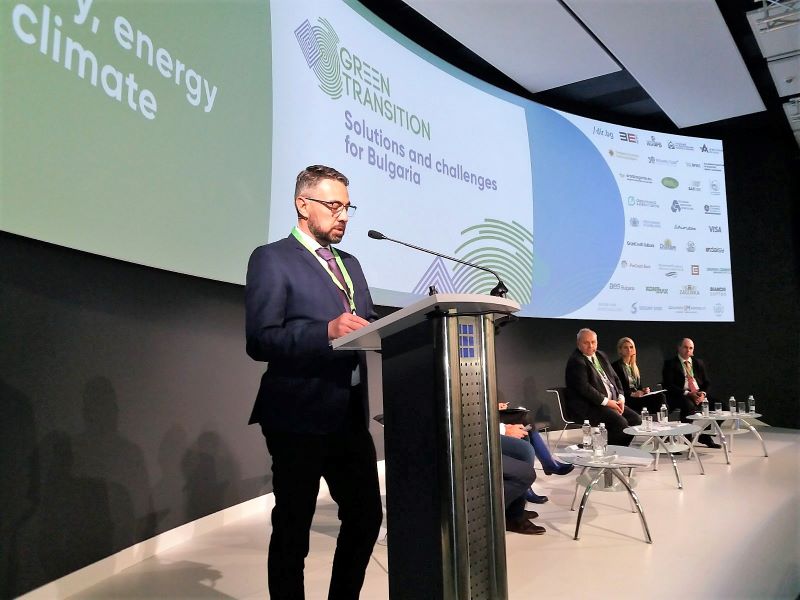Minister Zhivkov: Green transition confronts us with challenges, but it also unlocks unused opportunities
We support the EU's measures on the road to a zero-carbon economy by 2050. At the same time, we stand at the position that this transition must take into account regional differences and the specificities of each country in the community, tailored to the national energy mix and energy security, Energy Minister Andrey Zhivkov told participants and guests at the international conference “Green Transition: Solutions and Challenges for Bulgaria”.
Minister Zhivkov spoke extensively on the topic of decarbonizing the energy system, which is crucial for its future. Over 75% of EU carbon emissions are the result of energy production. Green transition holds a major place in the National Recovery and Sustainability Plan, providing for 38,1% of total cost. The country thus contributes to the achievement of the common European goals, the energy minister underlined. Further challenges are also linked to the new EU legislative package “Fit for 55” that raises EU ambition in primary and final energy consumption by 2030 through indicative national energy efficiency targets in all sectors.
The EU Green Deal sets the ambitious target by 2050 Europe to become the first climate neutral continent, Minister Zhivkov said. Implementation steps will be accompanied by more social commitments so that the process can be smooth and just.
Minister Zhivkov highlighted that the most affected by the transformation are coal regions and the most urgent issue is the future “phasing out” of coal-fired power plants. This term in my opinion is not accurate because, for these territories, we envisage a new life-cycle in the future related to gas-based capacity, hydrogen, RES projects etc., the minister said. Their economic outlook after the transformation is an issue that requires the joint work of the ministries of the economy, the regional development and the environment, along with a dialogue with the largest number of stakeholders.
We have proposed for discussion 2038 and 2040 as indicative deadlines for the end of operation of coal capacities in Bulgaria. Each of these years will be accompanied by an indicative scenario for gradual transition stages, which will be developed on the basis of a broad public consultation. These decisions are definitely not easy ones, but in the same time they provide us with many new opportunities for the future. What is important is that the discussion has started, since the topic was not prioritized over the last 20 years, Minister Zhivkov pointed out.
To support Member States and to mitigate the negative consequences, the European Commission has developed a Just transition mechanism targeting the most affected regions. The envisaged grant funds for Bulgaria amount at EUR 1,178 billion. The mechanism will finance areas or parts thereof based on approved by the EC territorial plans for just transition. The Ministry of Energy is responsible for the activities on drawing up these plans for the three leading coal regions in Bulgaria (Stara Zagora, Kyustendil and Pernik), with an evaluation of additional territories. For the successful implementation of the transition, the Recovery and Sustainability Plan foresees the establishment of an Energy Transition Commission with a broad stakeholder involvement that will develop the scenarios for moving towards climate neutrality of the economy, Minister Zhivkov said.
Despite the limited mandate and the absence of parliamentary support, the caretaker government is required to take strategic decisions in short terms, the energy minister stressed. He took the commitment that in this process all decisions will be taken after a broad public consultation, taking into account the interests of all stakeholders.

